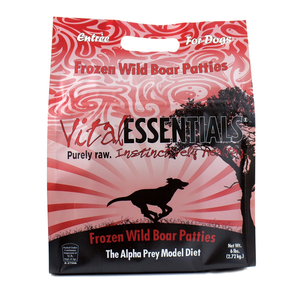Vital Essentials Frozen Entrees Wild Boar Patties Review
PawDiet has been helping pet owners since 2015. To fund our efforts, articles may include affiliate links; if you buy something through a link, we may earn a commission.
Review of Vital Essentials Frozen Entrees Wild Boar Patties
According to our data, this Vital Essentials recipe provides complete & balanced nutrition for all life stages. In other words, this formula is AAFCO approved.
Vital Essentials Frozen Entrees Wild Boar Patties is formulated to meet the nutritional levels established by the AAFCO Dog Food Nutrient Profiles for all life stages.
Review of Ingredients
In our review of Vital Essentials Frozen Entrees Wild Boar Patties, we'll examine all 9 ingredients and highlight the nutritional contribution of each ingredient.
While the first few ingredients typically dominate the recipe's composition, ingredients in small quantities can still have a meaningful impact on the overall nutritional profile of the recipe.
Wild boar (ground with bone) is a high-quality protein source that provides essential amino acids, vitamins, minerals, and natural calcium for bone health. It supports muscle growth and repair, overall health, and well-being in dogs.
Wild boar liver is a nutrient-dense ingredient that provides high-quality protein, essential vitamins, and minerals for your dog. It is rich in vitamin A, iron, and other important nutrients that support immune function, maintain healthy muscles, and promote overall well-being.
Wild boar lung is a rich source of protein that helps to build and repair body tissues. It is also low in fat, making it a healthy option for dogs.
Wild boar heart is a lean, high-quality protein source that is rich in essential nutrients such as taurine, which is vital for maintaining your dog's heart health. It also contains various vitamins and minerals that support muscle growth and maintenance.
Wild boar kidney is a nutrient-dense, protein-rich organ that provides essential vitamins, minerals, and amino acids for your dog. It promotes overall health, supports a strong immune system, and ensures optimal organ function.
Wild boar blood is rich in iron and other minerals, and can enhance the taste of dog food.
Wild Boar Trachea is a natural source of chondroitin, which supports joint health.
Herring oil is rich in Omega-3 fatty acids, which promote a healthy skin and coat, support brain function, and contribute to overall heart health in your dog.
D-alpha tocopherol is a natural form of Vitamin E, a powerful antioxidant that helps to protect your dog's cells from damaging free radicals.
Review of Guaranteed Analysis
The crude protein content, which is a minimum of 14.50%, is primarily derived from the ground wild boar with bone, wild boar liver, lung, heart, and kidney. These are all rich sources of animal protein, which contribute to the overall protein content of the pet food. Muscle meats like wild boar provide complete amino acid profiles necessary for pets, while organs such as liver and kidney are also known for their high protein content and nutrient density.
Crude fat, with a minimum of 9.00%, is likely to come from the ground wild boar as well, especially considering that wild boar meat can be quite fatty. Additionally, the inclusion of herring oil significantly contributes to the fat content. Herring oil is a source of essential fatty acids, including omega-3s, which are beneficial for a pet's skin, coat, and overall health. The combination of animal fat from the boar and the herring oil ensures a balanced supply of fats.
The crude fiber content, which has a maximum of 1.50%, is relatively low, as expected in a primarily meat-based diet. The fiber in this pet food could be incidental, coming from the connective tissues associated with the bone and trachea included in the ground wild boar. Since there are no plant-based ingredients such as grains or vegetables listed, which are typical sources of fiber in pet foods, the fiber content is naturally kept to a minimum.
The wild boar blood and d-alpha tocopherol (a form of Vitamin E) do not significantly contribute to the crude protein, fat, or fiber content. However, they do contribute to the overall nutritional profile of the pet food. Blood can be a source of minerals and vitamins, while d-alpha tocopherol acts as a natural preservative and a source of vitamin E, an important antioxidant.

